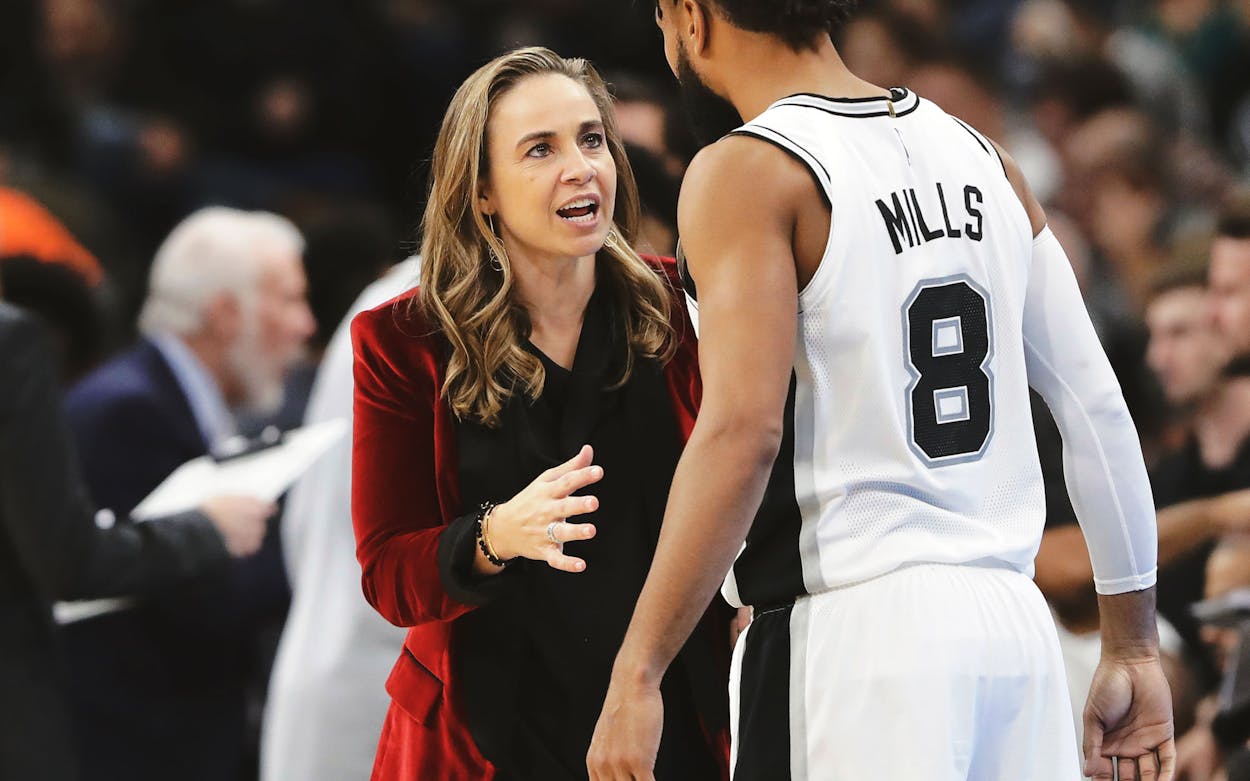When Becky Hammon joined the Spurs as an assistant coach in 2014—the first woman in league history to hold the position—the announcement was met with enthusiasm. Barack Obama congratulated her on Twitter, and then-ESPN personality Skip Bayless preempted criticism he seemed to expect from some of his listeners.
Congrats to @BeckyHammon, @NBA's first full-time female coach. When #WomenSucceed, America succeeds — and we know the @Spurs will, too. -bo
— White House Archived (@ObamaWhiteHouse) August 7, 2014
One day, I believe, Becky Hammon will be the NBA's first female head coach. That's how much Pop thinks of her. This was no PR move. Legit.
— Skip Bayless (@RealSkipBayless) August 6, 2014
And Bayless’s prediction could be coming to fruition in the near future. Last week, the Milwaukee Bucks announced that Hammon would be interviewing for the team’s open head coaching position. So Hammon—the first woman assistant, first woman to coach a team to a Summer League championship, first woman to take on head coaching duties in a preseason game—could be on the cusp of another first.
Hammon’s name has come up a lot over the past few months. She was pursued by Colorado State University for its open men’s basketball coaching position in March, but she ultimately opted to stay in the NBA. Fans and columnists for seemingly every team with a vacancy at head coach have pointed to Hammon—the Orlando Sentinel urged the Magic to hire her, and there have been similar arguments made toward ownership at the Knicks, the Suns, and the Grizzlies. The Bucks, however, are the first team to indicate to reporters that they’re interested in bringing Hammon in for an interview—and that’s a significant change, and not just for one basketball coach.
Hammon’s success with the Spurs has already been followed by more women getting opportunities in pro sports leagues where the players are men—and history tells us that when those initial barriers are broken, other changes tend to follow. It took 63 years for Jackie Robinson to become the first black player in Major League Baseball, and it took Larry Doby three months to become the second. The NFL’s Rooney Rule, which states that for every opening head coach and general manager position, teams must interview a candidate of color, dramatically changed the rate at which coaches of color were added to the league: as FiveThirtyEight pointed out in 2016, in the twelve seasons before the rule went into effect, the NFL had just six head coaches who weren’t white; in the twelve seasons that followed, they added fourteen. (The Sacramento Kings have, since Hammon entered the league, hired two female assistants. In the NFL, the 49ers and the Bills each now have a female assistant on the full-time staff.)
Hammon, by virtue of her talents, helped pave the way for female coaches in men’s pro sports. Gregg Popovich calls her “the ultimate leader”; Tony Parker calls her a “great basketball mind”; Manu Ginobili describes her as “committed,” “passionate,” “smart,” and “worldly.” And of course she is—any woman who’s going to be the first to break into a field that is otherwise staffed entirely by men has to be great, because the level of scrutiny she faces and the skepticism of the men around her are going to be higher than for just another guy in the locker room.
It also helps that Hammon has Pop in her corner. That’s a pedigree that’s worked out in the NBA before. Current branches of the Popovich coaching tree excelling in the league include Clippers coach Doc Rivers, 76ers coach Brett Brown, and Pelicans GM Dell Demps, and Utah Jazz GM Dennis Lindsey. All of these things together may not be enough to get Hammon the job in Milwaukee, of course (she previously interviewed for the team’s GM position last summer, but didn’t make the finalists). Head coaching jobs are hard for anyone to get, and the fact that whoever hires Hammon will be breaking a major barrier in sports means that, while no one is likely to get fired for passing on Hammon even if she’s great, there’s likely to be serious blowback for taking her if she doesn’t exceed all expectations.
But the fact that she’s here at all is exciting. A world in which more men, in sports and elsewhere, are able to be led by women is a better world on its own. But Becky Hammon, who’s succeeded at every level where she’s had an opportunity, could make basketball better, too. Whenever that happens, whether it’s in Milwaukee, at one of the other openings in 2018, or elsewhere (perhaps as the heir to Popovich, who at 69 is among the oldest coaches in NBA history), there’ll be a lot to root for—both on the court and off.
- More About:
- Sports








